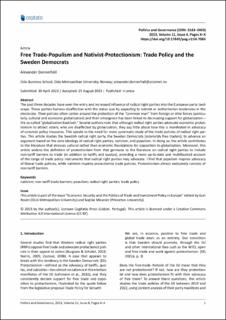Free Trade-Populism and Nativist-Protectionism: Trade Policy and the Sweden Democrats
Peer reviewed, Journal article
Published version
Permanent lenke
https://hdl.handle.net/11250/3097694Utgivelsesdato
2023Metadata
Vis full innførselSamlinger
- Publikasjoner fra Cristin [3256]
- SAM - Handelshøyskolen [392]
Originalversjon
https://doi.org/10.17645/pag.v11i4.7066Sammendrag
The past three decades have seen the entry and increased influence of radical right parties into the European party land‐
scape. These parties harness disaffection with the status quo by appealing to nativist or authoritarian tendencies in the
electorate. Their policies often center around the protection of the “common man” from foreign or elite forces (particu‐
larly, cultural and economic globalization) and their emergence has been linked to decreasing support for globalization—
the so‐called “globalization backlash.” Several authors note that although radical right parties advocate economic protec‐
tionism to attract voters, who are disaffected by globalization, they say little about how this is manifested in advocacy
of concrete policy measures. This speaks to the need for more systematic study of the trade policies of radical right par‐
ties. This article studies the Swedish radical right party, the Sweden Democrats (ostensibly free traders), to advance an
argument based on the core ideology of radical right parties, nativism, and populism. In doing so, the article contributes
to the literature that stresses cultural rather than economic foundations for opposition to globalization. Moreover, this
article widens the definition of protectionism from that germane to the literature on radical right parties to include
non‐tariff barriers to trade (in addition to tariffs and quotas), providing a more up‐to‐date and multifaceted account
of the range of trade policy instruments that radical right parties may advocate. I find that populism inspires advocacy
of liberal trade policies, while nativism inspires protectionist trade policies. Protectionism almost exclusively consists of
non‐tariff barriers.

